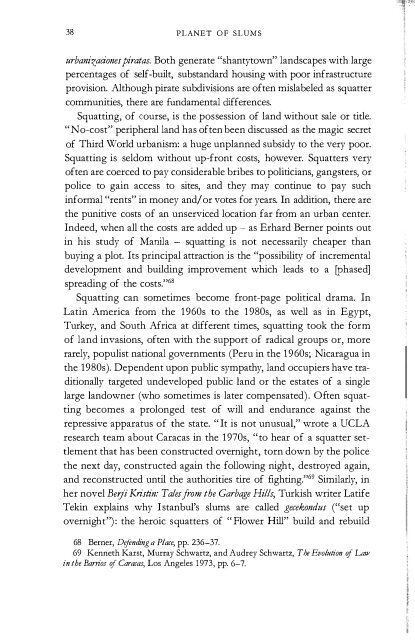Untitled - Rebel Studies Library
Untitled - Rebel Studies Library
Untitled - Rebel Studies Library
You also want an ePaper? Increase the reach of your titles
YUMPU automatically turns print PDFs into web optimized ePapers that Google loves.
38 PLANET OF SLUMS<br />
urbanizadones piratas. Both generate "shantytown" landscapes with large<br />
percentages of self-built, substandard housing with poor infrastructure<br />
provision. Although pirate subdivisions are often mislabeled as squatter<br />
communities, there are fundamental differences.<br />
Squatting, of course, is the possession of land without sale or tide.<br />
"N o-cost" peripheral land has of ten been discussed as the magic secret<br />
of Third World urbanism: a huge unplanned subsidy to the very poor.<br />
Squatting is seldom without up-front costs, however. Squatters very<br />
often are coerced to pay considerable bribes to politicians, gangsters, or<br />
police to gain access to sites, and they may continue to pay such<br />
informal "rents" in money and/ or votes for years. In addition, there are<br />
the punitive costs of an unserviced location far from an urban center.<br />
Indeed, when all the costs are added up as Erhard Berner points out<br />
in his study of Manila squatting is not necessarily cheaper than<br />
buying a plot. Its principal attraction is the "possibility of incremental<br />
development and building improvement which leads to a [phased]<br />
spreading of the costS."68<br />
Squatting can sometimes become front-page political drama. In<br />
Latin America from the 1960s to the 1980s, as well as in Egypt,<br />
Turkey, and South Africa at different times, squatting took the form<br />
of land invasions, often with the support of radical groups or, more<br />
rarely, populist national governments (Peru in the 1960s; Nicaragua in<br />
the 1980s). Dependent upon public sympathy, land occupiers have traditionally<br />
targeted undeveloped public land or the estates of a single<br />
large landowner (who sometimes is later compensated). Often squatting<br />
becomes a prolonged test of will and endurance against the<br />
repressive apparatus of the state. "It is not unusual," wrote a UCLA<br />
research team about Caracas in the 1970s, "to hear of a squatter settlement<br />
that has been constructed overnight, torn down by the police<br />
the next day, constructed again the following night, destroyed again,<br />
and reconstructed until the authorities tire of fighting."69 Similarly, in<br />
her novel Beryi Kristin: Tales from the Garbage Hills, Turkish writer Latife<br />
Tekin explains why Istanbul's slums are called gecekondus ("set up<br />
overnight"): the heroic squatters of "Flower Hill" build and rebuild<br />
68 Berner, Defending a Place, pp. 236-37.<br />
69 Kenneth Karst, Murray Schwartz, and Audrey Schwartz, The Evolution of Law<br />
in the Barrios of Caracas, Los Angeles 1973, pp. 6-7.<br />
THE PREVALENCE OF SLUMS 39<br />
every shanty by night, because the authorities tear them down each<br />
morning. Only after a Homeric siege of 37 days does the government<br />
finally relent and allow the new gecekondu to take root on a garbage<br />
mountain.70<br />
Most squatter communities, however, are the result of what sociologiS.L.Lliay:at,<br />
writing about Tehran and Cairo, has called the "quiet<br />
encroachment of the ordinary": the small-scale, nonconfrontational<br />
infihl:ation of edge or interstitial sites. Unlike poor peasants' "Brechtian<br />
mode of class struggle and resistance" famously evoked in studies by<br />
James Scott these struggles of the urban poor are "not merely defensive,"<br />
but, according to Bayat, "surreptitiously offensive" as they<br />
ceaselessly aim to expand the survival space and rights of the disenfranchised.71<br />
Such encroachments, as we shall see in the next chapter, are<br />
frequently synchronized to a favorable opportunity for land occupation,<br />
such as a tight election, natural disaster, coup d'etat, or revolution.<br />
Squatting of all varieties probably reached its peak in Latin America,<br />
the Middle East, and Southeast Asia during the 1970s. Today squatting,<br />
stricto sensu, continues primarily in low-value urban land, usually in hazardous<br />
or extremely marginal locations such as floodplains, hillsides,<br />
swamps, or contaminated brownfields. As the urban economist Eileen<br />
Stillwaggon notes: "Essentially, squatters occupy no-rent land, land<br />
that has so little worth that no one bothers to have or enforce property<br />
right to it.'>72 In Buenos Aires, for instance, most of the villas de emergenda<br />
often settled by illegal Bolivian and Paraguayan immigrants are<br />
located along the reeking banks of the heavily polluted Rio de la<br />
Reconquista and Rio de la Matanza. "Stagnant water and untreated<br />
sewage," writes geographer David Keeling of a visit to a typical villa<br />
along the Rio Reconquista, "created an overpowering stench, and the<br />
entire area was overrun with rats, mosquitos, flies, and other insects."<br />
The villas are tolerated only because such brownfield sites are temporarily<br />
worthless in a depressed economy.73 Likewise, in Caracas precarious<br />
70 Latife Tekin, Beryl' IVirtin: Tales from the Garbage Hills, London 1996 (published<br />
in Turkey in 1984).<br />
71 Asef Bayat, "Un-civil Society: The Politics of the 'Informal People'," Third<br />
WorldQuarter!y 18:1 (1997), pp. 56-57.<br />
72 Eileen Stillwaggon, Stunted Lives, Stagnant Economies: Poverty, Disease and<br />
Underde·/}elopment, New Brunswick (NJ) 1998, p. 67.<br />
73 Keeling, Buenos Aires, pp. 102-05.


